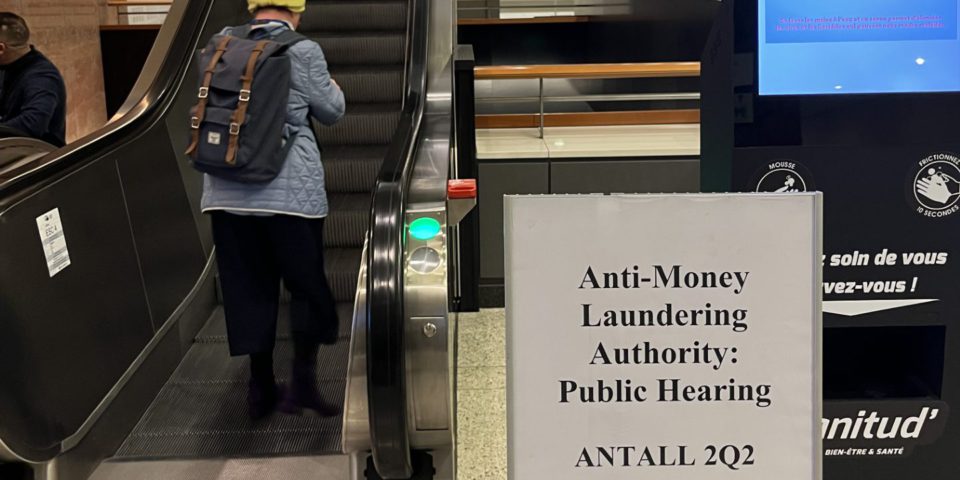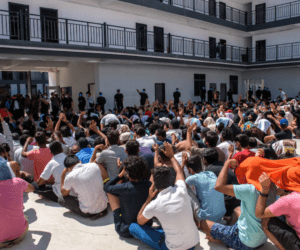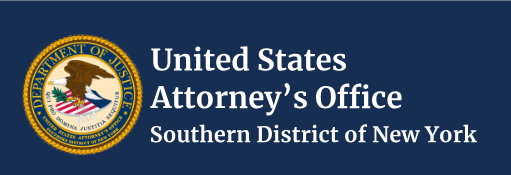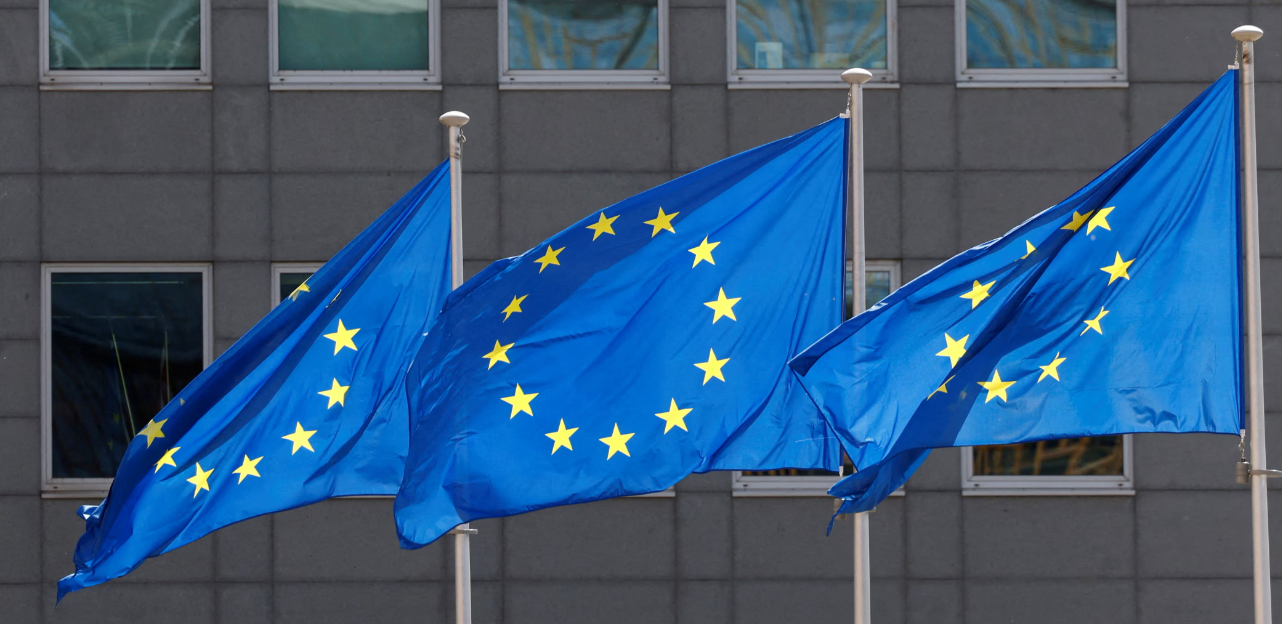By Laura Lynott, Senior Correspondent
OVER 12 hours of hearings the nine competing cities to host AMLA gave varying accounts of themselves in the competition to host the agency.
The public hearings at the European Parliament were sometimes testy – particularly when MEP Clare Daly was eviscerating – unfairly so – of Latvia’s pitch. Many observers of EU affairs will have their own opinions of Daly’s motives and the timing of her intervention.
It was clear the MEPs were in charge – albeit it was supposed to be a joint hearing with the European Council (representatives of the Member States). At one stage the parliament’s Rapporteur on AMLA Eva Maria Poptcheva had to chide the Council representatives into being more active in their questioning. Indeed she succeeded and the afternoon sessions were far more interactive.
A vote on the bids now takes place later this month (February 22), bringing the future of AMLA a step closer to realisation.
After a day of observing the events unfold, it was clear that the competition is down to four – Germany, Ireland, Spain and France. This is a snapshot of the main runners and riders:
Germany
FRANKFURT’s delegation stated it would pledge €10m to the creation of AMLA, with Germany’s Federal Minister of Finance, Christian Lindner, pledging the city had the “biggest ability to use digital resources,” with specialist German innovations aimed specifically at fighting money laundering.
Frankfurt also offered easy access to a global banking centre and Minister Lindner said Germans stood as “pioneers,” in AML, with new laws copper fastened to tackle financial crimes. While the city was firmly concentrated on leading in the fight against money laundering.
But as Far-Right politics makes gains in Germany with the AfD Party (The Alternative for Germany), questions were asked if a Far-Right government could take power.
Minister Lindner stated there was “zero” chance of this taking place.
While Frankfurt Lord Mayor Mike Josef instead highlighted the city’s diverse culture, which the delegation guaranteed would welcome any AMLA staff moving to the city.
“As a child of refugees, I am now Lord Mayor of Frankfurt,” he said. “In hardly any other state that would have been possible. We welcome people with potential. We live peacefully together.”
Minister Lindner added that after the last FATF study “we got support to fight money laundering, bringing together different remits. We assume in the international context, we will be pioneers. “We have new laws to tackle financial crimes. (We aim) to be leaders in the fight against money laundering.”
The day-long public hearing saw delegates from Rome, Vienna, Vilinius, Riga, Frankfurt, Dublin, Madrid, Paris and Belgium, put forward their bids, with questions directed from Members of Parliament (MEPs) from each member State to test the strength of the applications.
Ireland
IRELAND’s Finance Minister, Michael McGrath, stated that Dublin’s €80m bid to host AMLA was proof of the seriousness of its dedication. The infrastructure is “ready to go from day one” in Dublin for AMLA, Minister McGrath added.
While Ireland’s connections to the U.S and UK was also a vital component to the bid. The relationships between the two nations, “runs deep” due to “familial and cultural ties,” Minister McGrath added.
The Irish delegation told the EU Parliament how Dublin Airport allowed easy passage to the UK and there was a favourable “pre-clearance to the U.S” available from Dublin Airport and Shannon Airport to the States.
Minister McGrath said: “We have a clear vision” and it made sense that AMLA would be located in “Dublin, a compact city, with a strong regulatory culture.”
“We have a long track record in combatting criminality and terrorist financing.,” Minister McGrath said.
“We want to make AMLA operational from day one, with premises available now,” he added.
Questions were raised by delegates from The Netherlands about Ireland’s housing crisis, a factor which it was felt could affect international staff.
Minister McGrath responded: “In terms of housing, the population is growing at a quick rate but housing output is growing. The population in Ireland is young.
“People want to live in Ireland because of the quality of life. There has been a 10pc increase in housing in 2023.
“We have built over 100,000 homes (since coming into office.) We have more work to do but it’s a challenge we are meeting… to meet the housing needs of a growing population.”
The Netherlands also questioned the Irish representatives on the country’s continuing international reputation as a “tax haven,” in a statement querying the country’s suitability to host AMLA.
Minister McGrath responded: “We have introduced corporate tax reforms and transposed anti tax avoidance, enhanced foreign company rules, mandatory disclosure rules.”
Minister McGrath said Ireland hoped to reach a global settlement with regards to global tax.
Irish Minister of State with responsibility for Financial Services, Jennifer Carroll MacNeill, pointed out that Ireland had recently led a recent successful investigation, leading to prosecutions into the Black Axe Gang, an international €70m global fraud gang, with links to the State.
This was an example of the Irish ability to deal with international fraud, she explained.
Minister Carroll MacNeill also underlined that Ireland had created the Criminal Assets Bureau (CAB) to seize the proceeds of crime from Irish criminals. The agency was launched 26 years ago.
This model had been a successful route in dealing with money laundering and financial crime and CAB is a model that’s been replicated since by other nations, she stated.
She added: “Ireland is a hub for fintech. Ireland is home to 16 of the 20 top fintech companies.”
Over 100,000 people are employed in financial services in Ireland and thousands more within the financial ecosystem, she added.
“We’re independent” and “we’re not in the shadow of an international industry,” she said.
“Our capacity and history (welcomes) staff coming to Ireland and Dublin. Over 18.5pc of our workforce (is international) We welcome and integrate international workers,” she added.
The Irish bid was thorough and detailed but Spain’s was also concise and underscored important links with Latin America.
Spain
CARLOS Cuerpo, Minister of Economy for Trade and Business in Spain, told the Parliament the link would be vital going forward when addressing international financial terrorism and global money laundering.
“We will take the European model and transport it around the world, including to Latin America,” Minister Cuerpo said.
“We have been fighting this plague for 33 years,” Minister Cuerpo added. He stated that all agencies should be “Brought together, with access to data and reports, to strengthen procedures.”
In Spain, Seplac is in charge of financial and non financial regulation and he felt it would make sense for AMLA to be located nearby.
Madrid and Spain are extremely well connected, he added. This was an important factor in the post pandemic world and the country has a “good approach” to remote working, Minister Cuerpo added.
The Spanish delegation said there are 77 international schools, with eight languages, and six business schools. Spanish is the second most spoken language in the world, the party explained.
While healthcare was excellent in the city and Madrid has the highest life expectancy in Europe, the delegation stated.
“The choice is not easy and we have full respect for the other candidates but we have to maintain a clear vision for what we want for AML,” Minister Cuerpo said.
“It will determine the success in fighting the global challenge. What we have is unique. Spain is the international benchmark. We rank highest in supervision and financial intelligence,” he added.
“Spain has been recognised in the fight against financial terrorism. We are constantly contributing to global expertise. We are committed to helping the EU.”
France
FRANCE’s bid was also impressive, with the Minister of the Economy, Finance and Recovery, for the French Government, Bruo Le Maire, vowing: “We can offer the ideal location for this new agency. We will do our utmost to implement the agency.”
Minister Le Maire congratulated all the bidders on their applications but Paris was, he added, was the most suitable location, he felt.
If AMLA was to be based in Paris, the institution would become part of a wider “ecosystem” fighting financial crime, Minister Le Maire stated.
The Parisian system would “probably be the best in the world (if all relevant institutions) were based in Paris,” he added.
Minister Le Maire said: “We have the most effective provision in the whole of the European Union.”
The banking system was acutely monitored, including the observation of staff and even their families, he added.
But while other member states committed to vast sums to house AMLA, Paris would not be following suit, he admitted.
The plan would be to start smaller and increase building space as the institution grew, he said.
“There will be a progressive development of AMLA,” Minister Le Maire said.
“AMLA is a regulatory and supervisory organisation,” he added. “The cost needs to be (provided) by the institutions being supervised. Public money isn’t there to cover supervision.”
Minister Le Maire said unfortunately Paris and France had experience of terror attacks but this also meant “expertise” had grown as a result.
“We will freeze the assets of all terrorist organisations and seize assets of terrorists operating on our territory. So, we are one step ahead,” he said.
But two thirds of the financial contribution offered by France to AMLA would be exhausted within two years, Spanish MEP Eva Maria Poptcheva said and she questioned the ability of staff to move to Paris, a city marred by high rental prices.
The French delegation argued that Paris was not any different to other EU states, struggling with high rental prices.
Minister Le Maire vowed: “We can make Paris the world capital for the fighting against money laundering and the financing of terrorism.
“Paris is attractive in terms of leisure and education for the families of employees and Paris is exemplary in fighting money laundering. We rank the best in the fight against money laundering.”
Share this on:
Follow us on:











